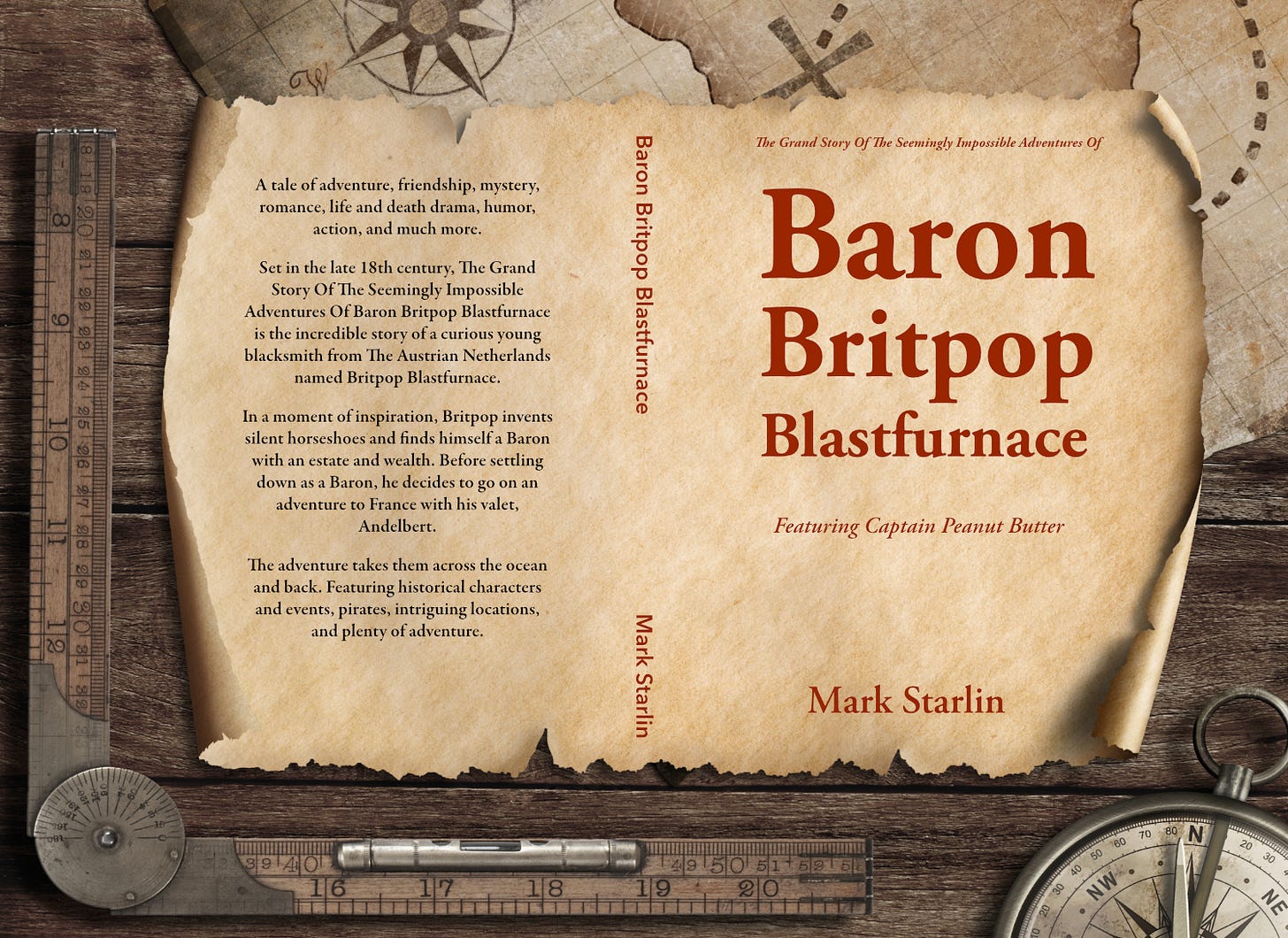As we sailed toward Spain, several unexpected things happened. I began to enjoy my time onboard The Jellyfish. The crew was not much different than the crew onboard the Sea Merchant II. I suppose sailors are sailors, and the tasks required to sail are the same on both ships. I surprised myself by learning several of the sailor’s jobs, thanks to Andelbert’s excellent tutoring. But one wholly unexpected thing was a nightly invitation for Andelbert and me to dine with the Captain in his quarters.
For some reason, Captain Peanut Butter seemed to find the life of a Baron fascinating, although I was still quite new at it. Fortunately, Andelbert was vastly more knowledgeable, having served a Baron longer than I had been one. The Captain found the story of how I became a Baron captivating and asked question after question. In fact, he made me tell the story to the whole crew one evening.
Andelbert also shared his tale of how he came to work for Baron Raspberry. The crew particularly enjoyed the part when the servant girl offered to kiss him. It drew hoots and great laughter from most of the crew, which caused Andelbert to blush brilliantly.
The Captain also seemed to enjoy my descriptions of Kapri and the day-to-day life there. I began to suspect that the Captain enjoys the adventure of sailing to new lands far more than he enjoys pirating. And I also imagine any new story is a welcome story when you are at sea. But little surprised me more than the night when the Captain told a tale of his own.
The men were enjoying a break from their labors one evening when the Captain joined them on deck.
“Will you tell us a tale, Cap’n?” Stout asked when he saw the Captain arrive.
Captain Peanut Butter thought for a moment and said, “Alright, lads, listen close.” Then he began.
There once was a kindly King in a faraway land. He had a good wife, and she was with child. Soon, a girl was born. She had beautiful golden hair—so beautiful that her mother refused to allow anyone to cut it. The years passed, and her hair grew long enough to touch the ground.
The King wisely said, “It is time to cut her hair.”
His Queen begrudgingly agreed. She knew it was the practical thing to do, so she got her sharpest pair of scissors and, with a small sob, began to cut off several inches of hair. But oddly, the hair would not cut. The scissors simply would not slice through the hair. Wide-eyed, she went to her husband and began to tell him what had happened.
He scoffed and said, “Really now, that is enough. Give me the scissors.”
He marched into her room and tried to cut her hair himself. But try as he might, he could not cut one strand of her hair. Shocked, he got out his sword, which he kept sharper than any razor, and tried using it to cut her hair. Still, her hair would not cut.
As the girl and her hair continued to grow, the King and Queen became desperate and tried everything and anything they could think of to shorten her hair but failed. Her hair became a problem. As it grew, she had to braid it, coil it, and carry it if she wanted to walk anywhere.
Eventually, it became too much to carry, and she had to put her hair in a wheelbarrow so the servants could wheel it around. By the time she was 17, her hair was unmanageable, and she was trapped at home.
They considered putting her in the tower bedroom because it was large enough to hold her hair, but they worried she would go to the window and let down her hair. Then, all manner of princes, farm boys, and ruffians would joyfully climb her hair, hoping to court the beauty in the tower.
Finally, her father said, “I am leaving to seek an answer to this problem. I will not return until I have found one.”
“Where will you go?” the princess asked.
“I will find the best blacksmiths to make the sharpest edges. I will seek out wizards to create cutting spells. I will recruit the strongest men on earth to tear your hair. I will go wherever I need and do whatever it takes.” He kissed her, turned, and left.
His journey was long and hard, and his mission bore no fruit. Yet he pressed on. One night, as they camped in a vast forest, the King awoke to the sound of a gentle, high-pitched neigh.
“Horse thief!” he cried, and his men sprung into action. They chased down the thief and knocked him to the ground. As a knight went to capture the thief—a boy of teenage years—the thief reached out his hand in defense of the blow the knight had leveled toward his head. The knight yelled out, “Blast, he cut me!” Anger flared in his eyes, and he reached for his sword.
The King, who saw the exchange, yelled, “No! Bring him here.”
The boy, now surrounded by knights with swords trained on him, realized escape was no longer possible and calmly went with the knight, who whispered to him that their business was not yet complete.
The King looked at the knight’s hand and saw four razor-sharp incisions that had sliced through the knight’s armored gauntlet and his skin with a single touch.
“How did you do this?” He asked the boy.
“It’s my nails, Sire,” the boy replied.
“They grow sharper than razors and can’t be dulled. They cut anything they touch. I try to be careful, but it does no good. I ruin everything I touch. I can’t do honest work and was run out of my village. I live here now. I occasionally cut the reigns and steal a horse from travelers to earn coins for supplies. I know it’s wrong, but I don’t know what else to do. I am stocking up for a trip to the sea so I can become a mercenary. I figure if I can cut a man as easily as a sword…”
“Enough talk,” the King said. “You will ride with me.”
The wounded knight glared at the boy but held his tongue. They rode in silence all the way back to the King’s castle. Once there, the King took the boy to his daughter’s room.
“Cut her hair,” was all he said.
The boy thought for a moment, then slowly reached out and brushed his fingers across the braid of her hair. It sliced cleanly. The King wept with joy, and the princess leaped into the boy’s arms, which he kept straight out, being extra careful not to cut the daughter of a King.
The King said, “You have my eternal gratitude. Your reward will be enough gold to live on for a lifetime and more. I forgive you of your crimes. You may go and live in peace, but you must return regularly to trim the princess’s hair.”
The boy thanked the King and began to leave when the princess said, “Father, he must stay for a while so I can hear his story.”
The King agreed, and the boy was made a welcome guest. But it didn’t take long for the welcome to wear thin once the boy started slicing up their furniture and tapestries with the occasional accidental touch. Soon, he was on his way back to the forest, where he built a fine house. He returned monthly to trim the princess’s hair, and eventually, they fell in love.
Their love was so strong that the boy approached the King to ask for her hand in marriage, knowing it was beyond all hope. The King initially refused, as expected, out of concern for his daughter’s safety. “How will you not harm her with those confounded nails?” He asked.
The boy replied, “I have learned to trim my nails extremely short, so they don’t protrude beyond my fingers. I never make fists, and I use only the inside of my hands to touch things. It works. If I wish to cut things, I allow one nail on my left hand to grow out slightly. Since I am right-handed, this prevents most accidents.”
Because the King loved his daughter, he agreed to allow the marriage.
And so they married and lived in a house in the forest, where the boy cut his bride’s hair into long strips, which she wove into the strongest rope in the kingdom. Sea captains came from every shore to purchase this amazing rope, which would not break or weather. And outside of the rare tiny nick, the boy never harmed his bride. They had four completely normal children, if there is such a thing, and lived out their days.
When Captain Peanut Butter finished the story, he leaned back.
Stout asked, “Is the tale true, Cap’n?”
“Of course, it’s true. It was long ago, but I once owned a length of the rope made from the princess’s hair.”
Cookie asked, “What happened to the rope, Cap’n ”
“I traded it for something even more valuable. But that, lads, is a story for another day.”
The crew seemed content. As was I.






